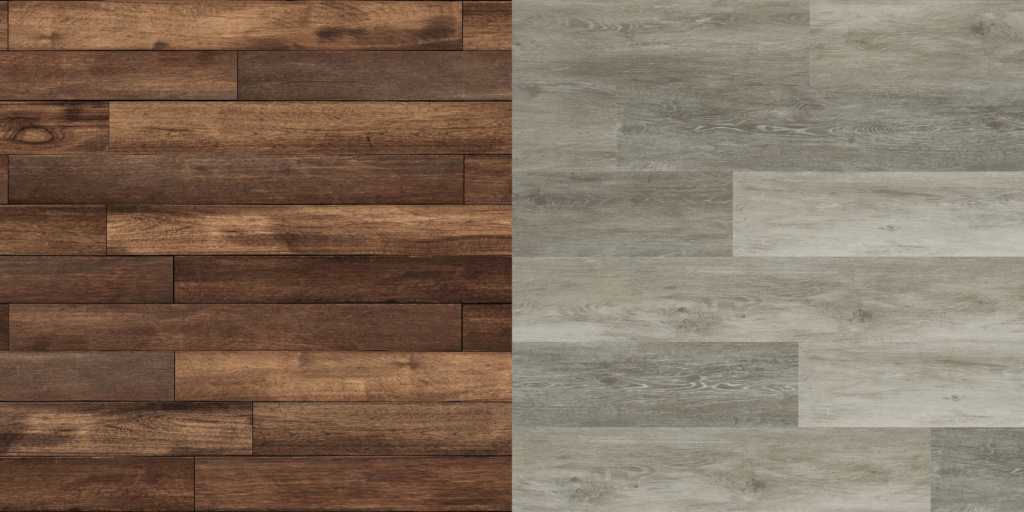Nowadays, it’s only possible to enter a home improvement store without seeing the many options available in traditional hardwood and modern vinyl plank flooring. Homeowners are often faced with the dilemma of choosing one or the other, according to their personal preferences and budget. Both choices offer inherent properties and benefits in design, function, and maintenance, each having its own set of characteristics that make them unique.
Hardwood

Wood flooring is made of natural, organic materials produced when trees are cut down, milled, sanded, and stained. The top surface is sealed with a protective finish to provide a durable, long-lasting flooring option that can be refinished countless times throughout its life. It is timeless, hardwearing, and comes in a variety of woods and grain patterns. It’s available in many different types of wood, ranging from walnut and oak to bamboo and cork. Wood flooring is a classic option and can add warmth, character, and beauty to a home, although there are more affordable options.
Vinyl Flooring

Vinyl flooring is made of synthetic materials and produced by combining polyvinyl chloride (PVC) with plasticizers. They are printed with a realistic-looking wood grain, tile, or stone surface pattern. It offers an artificial wood look, and it can be made to resemble or simulate real hardwood planks. Vinyl flooring is a popular option due to its affordability and ease of installation, and it requires minimal maintenance. It is also more durable than hardwood and resists scratches, spills, and fading.
The most popular types are luxury vinyl plank flooring (LVP), luxury vinyl tile (LVT) flooring, and sheet vinyl. Vinyl plank is a popular option for homeowners because of its low-maintenance properties and the fact that it’s resilient to water damage and warping. LVP also comes in various widths, lengths, thicknesses, and textures, so you can customize it to fit any decor style.
Cost Differences of Wood vs Vinyl Flooring

The cost of wood and vinyl flooring can vary greatly. While hardwood is generally more expensive, the type of wood and finish can affect the overall cost. For example, exotic woods like Brazilian cherry or mahogany typically cost more than domestic varieties such as oak or maple. The cost of installation can also affect the bottom line.
Vinyl flooring tends to be much more affordable than hardwood, with costs ranging from $1 to $5 per square foot for installation. Vinyl plank is typically less expensive than LVT, and sheet vinyl can be the most affordable option. Luxury vinyl flooring may cost more upfront, but its durability and low-maintenance requirements make it a wise choice in the long run. Some vinyl flooring even comes with warranties, saving you money in the long run.
Maintenance and Durability

I walked into the living room, and there was something about the floor that made me pause. Hardwood floors have a classic look that can never be replicated. They are also incredibly durable, with some types of wood capable of lasting for decades. Hardwood floors require regular maintenance such as sweeping, vacuuming, and occasionally refinishing to keep them looking shiny and new.
Meanwhile, vinyl flooring is also resistant to wear and tear but requires much less maintenance than hardwood. It can simply be wiped down with a damp mop or cloth occasionally to keep it looking clean and fresh. Vinyl plank flooring is also more resilient to spills and stains, and temperature changes, making it a great choice for households with children and pets.
Environmental Concerns

Changes in the weather, such as extreme temperatures and moisture, can cause wood to warp or buckle over time. Hardwood may not be the ideal choice if you live in a region with cold winters or frequent rain because it tends to warp or buckle.
Vinyl flooring is considered one of the most environmentally friendly options on the market because it’s made from recycled materials and doesn’t emit any harmful chemicals into the environment. Additionally, it can be recycled after its useful life when it’s no longer needed.
Conclusion
When it comes to hardwood and vinyl flooring, both options have their own set of characteristics that make them unique. Hardwood is a timeless classic with undeniable beauty, but its cost and maintenance requirements may put some homeowners off. Vinyl flooring is easy on the wallet and requires minimal maintenance, but it has a different classic look than hardwood offers. Ultimately, which one you choose will depend on your budget and lifestyle preferences.






